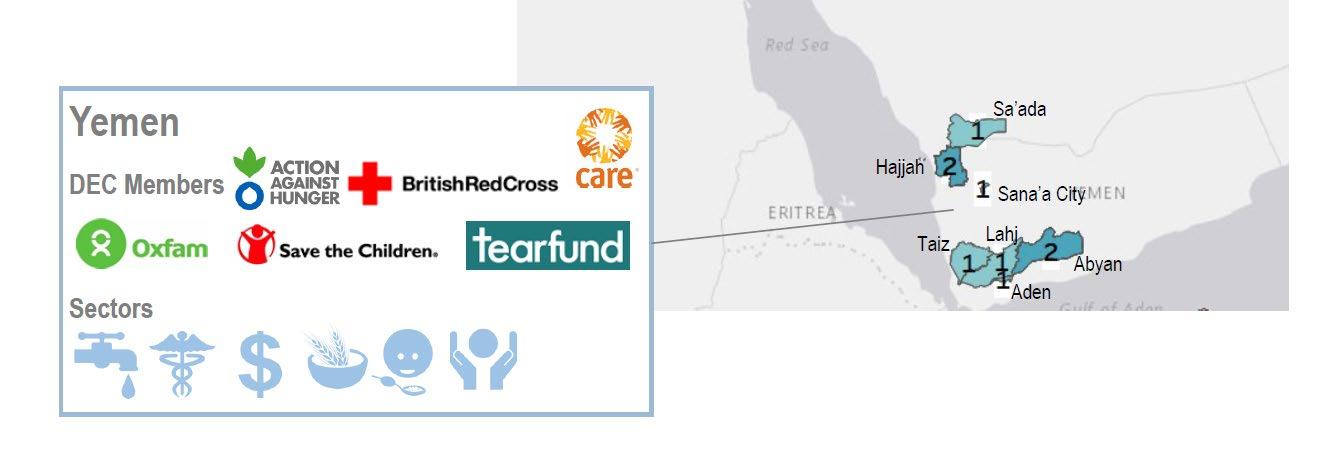
3 minute read
1.2. OBJECTIVES AND SCOPE OF THE REVIEW
cent of the entire population, in need of humanitarian assistance and protection to cope in their day-today lives.
The country’s health system has been weakened and has very limited capacity to cover basic health needs. Only half of Yemen’s pre-war health facilities are functional, and there is a widespread shortage of essential medical equipment. Over 3 million individuals are displaced, including 1.3 million living in IDP camps. More than half the Yemeni population, 17.5 million people, are in need of enhanced access to water, sanitation and hygiene (WASH) services. 54 districts have acute WASH deficits; and 46 districts are at high risk of cholera.
The first Covid-19 case was detected in Yemen on 10 April 2020, and between April and July, when decisions were being made about programmes, there were 484 deaths and 1,695 confirmed cases (WHO, 28 July). In November 2020, at the time of the Review, the total number of deaths is 605 for 2,077 confirmed cases (WHO, 26 November).
Covid-19 mitigation measures have included movement restrictions between governorates and along the borders with neighbouring countries (Saudi Arabia and Oman), closed seaports and airports, as well as partial lockdowns and curfews in Sana'a, Aden and other affected governorates.
The economic downturn following the conflicthas resulted in the destruction of social protection networks and basic services. This situation, combined with the misuse of many key agricultural and household resources for khat production and consumption is contributing to critical conditions of food security and nutrition, which have been worsened by the Covid-19 mitigation measures.
Despite this critical humanitarian situation, delivering aid in Yemen is extremely challenging. Numerous constraints already existed before the Covid-19 pandemic, ranging from insecurity to administrative restrictions and logistics problems. Humanitarian workers have been denied travel permits to different cities and the parties to the conflict impose arbitrary and excessive restrictions. The UN Panel of Experts on Yemen has criticised all parties to the conflict for increasing the suffering of civilians by impeding the delivery of humanitarian assistance. The question of access to communities has become even more complex in the current Covid-19 situation.
1.2.1. OBJECTIVES
The RTR aims at supporting real-time collective learning in order to identify lessons and adjustments for the second phase of the response. The three specific objectives of the RTR are: • Objective 1 Improve understanding of the impacts of the Covid-19 pandemic on contexts (evolving and diversified needs, access constraints, etc.), and on Member Charities, their partners and key stakeholders; • Objective 2: Analyse adjustments that have already been made or that are still needed in humanitarian programming in each country and globally; • Objective 3: Facilitate collective thinking between Member Charities about lessons and innovative ideas that have emerged from the response to the Covid-19 pandemic.
At country level, the RTR is directed at DEC Member Charities and their partners in order to support the improvement of their response to the pandemic during Phase 2. Each of the country reports will then feed
into a global analysis directed at DEC HQ Member Charities and the wider humanitarian community, which will aim to identify the main lessons learned for the response to the Covid-19 pandemic or similar crises.
1.2.2. S COPE OF THE R EVIEW
In Yemen, projects funded by the DEC are spread across the country in 9 different locations, both in Northern and Southern parts of the country. Six DEC partners, already working in the country prior to the pandemic, are being funded by the Covid-19 Appeal and are implementing programmes directly or through local partners.
Map 1 –DEC-funded project in Yemen
Table 1: Funded organisationsand sectors
Organisations Sectors Location
Action against Hunger Health & nutrition Abyan
British Red Cross
Wash & Livelihoods CARE International Health & Wash Sana’a city Amran
OXFAM Save the Children Tearfund
Health & Wash
Sa’ada and Hajjah Health, Nutrition, Protection, Wash Lahj and Hajjah Food and Wash Abyan, Aden & Taiz
The funded programmes are providing a wide variety of humanitarian assistance, including WASH, Health, FSL, CVA and Nutrition, implemented by 6 DEC Member Charities, with four out of six being implemented directly, while the other two are being implemented via local partners. The Covid-19 Appeal has placed major emphasis on WASH and Health activities aimed at mitigating the primary impact of Covid-19; they represent 56% of all activities. Other activities have been implemented to reduce the secondary impact of Covid-19, including Multipurpose Cash Assistance (17%), Food (15%), Nutrition (8%) and Protection (3%).




